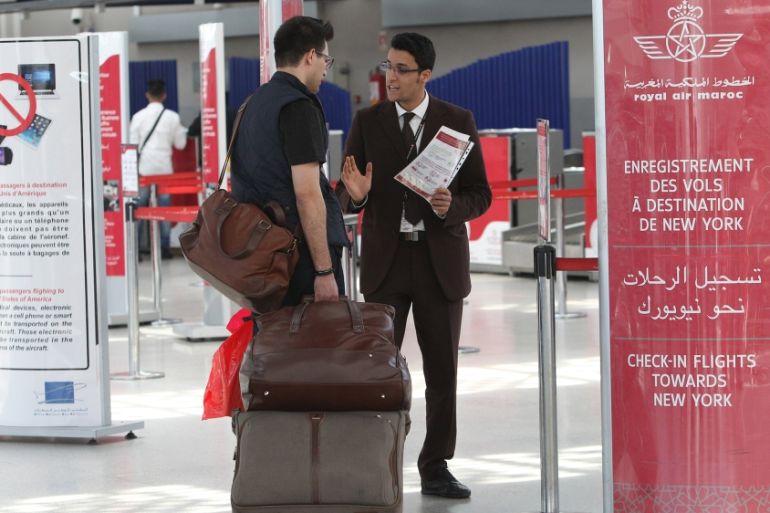The long reach of the US border
No matter where you are in the world, you are likely to stumble upon the US border-without-borders.

Earlier this summer, an American friend of mine was returning home from Tunisia, where he had been conducting PhD research.
Checking in for his connecting flight in Paris, he was put on the phone with a representative of US Customs and Border Protection for questioning – since we all know France shares a border with the United States.
Keep reading
list of 4 itemsEU signs off on sweeping migration overhaul ahead of elections
Number of internally displaced people hit record 75.9 million in 2023
Tunisia: The migration trap
Upon reaching America proper, my friend was hauled off for interrogation at the airport in New York on subjects ranging from the details of his Twitter account to the issue of whether or not anyone had suggested he join an armed group in Libya.
You can pick your own moral of the story. One possibility, perhaps, is that academics that insist on showing an interest in certain parts of the world should build detention time into their travel itineraries.
Another – more broadly applicable to the general global population – is that, no matter where you are, the US border can be brought to you.
Evolving frontier
|
|
While it might be tempting to blame US President Donald Trump and his special brand of counter-reality for the frenzied expansion of the US border into international spaces, the concept of the border itself evolved some time ago into something encompassing much more than physical territorial limits.
Just ask the victims of the post-9/11 “war on terror”, which has eliminated countless human lives for the ostensible purpose of securing the US homeland.
Indeed, the US habit of interrupting wedding festivities in Afghanistan and elsewhere with drone strikes long predated the current head of state – though Trump has adopted the drone obsession with predictable zeal.
Closer to home, meanwhile, US-bound Central American migrants regularly run afoul of the amplified US border and find themselves being deported from Mexico – a country roped into serving as a first line of defence against often-defenceless folks, many of them fleeing violent conditions that the US itself has played no small part in stoking.
Mexico, for its part, gets to enjoy the additional perks of being literally located on the US frontier, including imposed drug wars and economic devastation – not to mention the essential criminalisation of Mexican-ness via border fortification schemes and mass deportations.
Now, as Trump continues to plot his expanded wall on the US-Mexico border, the subtler but no less sinister expansion of the very idea of the US border – and all that it entails – proceeds apace.
While the US has over the decades repeatedly been up in arms over perceived enemy intrusions into its own 'backyard' - see, for example, the Soviets in Cuba or the more recent ruckus over Iran's supposed infiltration of Latin America - the country persists in trampling over other backyards at will.
Champions of empire
Beyond the matter of forcing international airlines to get on board with every US whim in terms of security measures and other life-complicating activities, there’s nothing like ubiquitous military bases to reinforce the notion that the world in fact belongs to America.
In his 2015 book Base Nation: How US Military Bases Abroad Harm America and the World, American University’s David Vine reported that, as of that year, the US “controlled approximately 800 bases” outside the country.
This had resulted in a situation in which, he said, “we probably have more bases in other people’s lands than any other people, nation, or empire in world history”.
Vine went on aptly to note that, for most Americans, “the idea of even the nicest, most benign foreign troops arriving with their tanks, planes, and high-powered weaponry and making themselves at home in our country – occupying and fencing off hundreds or thousands of acres of our land – is unthinkable”.
Thanks to imperialism’s gloriously hypocritical logic, of course, America’s disproportionate global footprint hasn’t stopped the US political establishment from regularly accusing selected nemeses of meddling in the internal affairs of other nations.
And while the US has over the decades repeatedly been up in arms over perceived enemy intrusions into its own “backyard” – see, for example, the Soviets in Cuba or the more recent ruckus over Iran’s supposed infiltration of Latin America – the country persists in trampling over other backyards at will.
Border without borders
When earlier this year the Gulf played host to close encounters between the Iranian navy and US ships, the Iranians were shamelessly portrayed as the aggressors despite the proximity of the incidents to Iranian territorial waters.
An ever-expanding border makes for an ever-bigger backyard, it seems.
Africa, too, is as good a backyard as any, judging from an April 2017 report from investigative journalist Nick Turse, managing editor of the TomDispatch website.
American military officials have consistently downplayed their presence in Africa, Turse writes, but “a set of previously secret documents, obtained by TomDispatch via the Freedom of Information Act, offers clear evidence of a remarkable, far-ranging, and expanding network of outposts strung across the continent”.
Turse goes on to predict that, “with the Trump administration escalating its wars in Africa and the Middle East, and the potential for more crises … on the horizon”, the US military footprint will continue to grow “outpost by outpost and base by base”.
And a US border-without-borders is, you might say, a crisis in itself.
Belen Fernandez is the author of The Imperial Messenger: Thomas Friedman at Work, published by Verso. She is a contributing editor at Jacobin Magazine.
The views expressed in this article are the author’s own and do not necessarily reflect Al Jazeera’s editorial policy.
